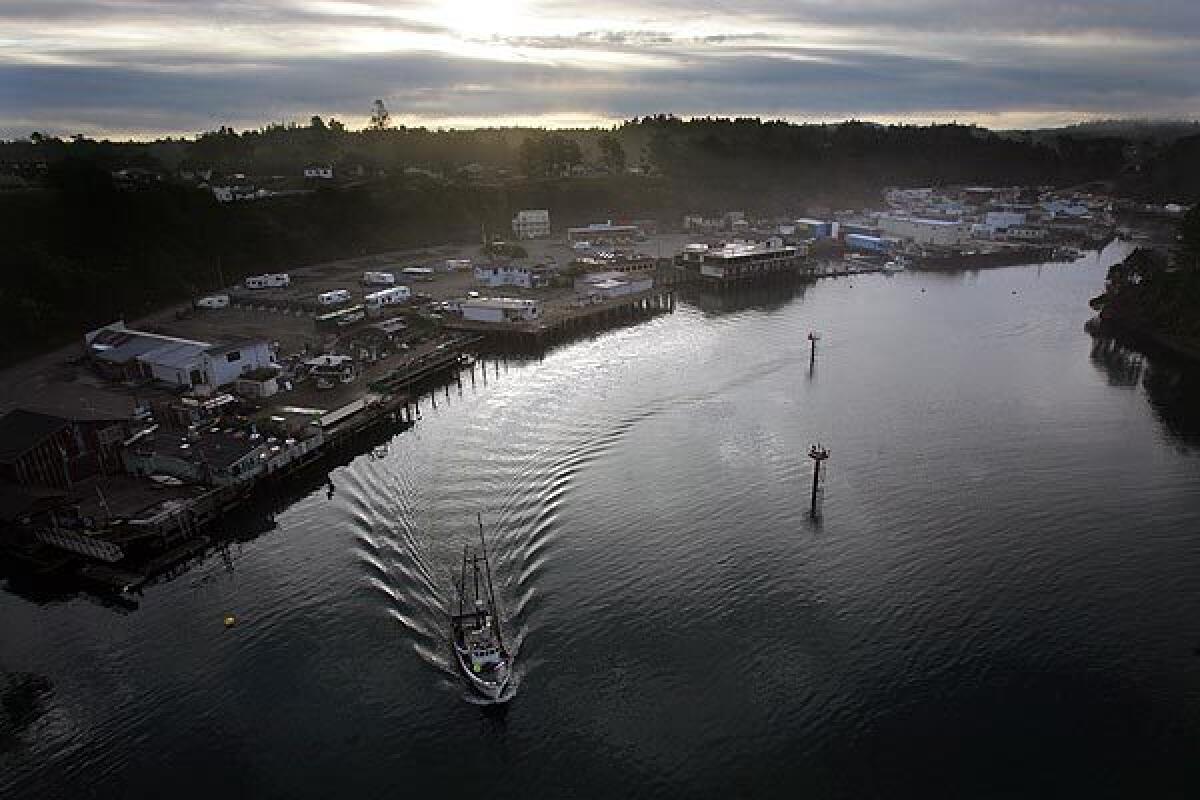California city named for a Confederate general will not put name change on November ballot

- Share via
The City Council of Fort Bragg, a small Northern California city named after Braxton Bragg, a Confederate army general and slave owner, decided that it will not place a town name change on the November ballot.
The decision came Monday night in the coastal Mendocino County town of 7,400 after more than three hours of public comment at the first in-person City Council meeting amid the coronavirus outbreak. Instead of a ballot measure, Fort Bragg Mayor Will Lee will appoint an ad hoc committee with two City Council members and residents to discuss options for the city’s name.
“We cannot ignore the hundreds of comments that were given to us in two weeks’ time, and especially so much [from] the young people that have come to us ... They’re teaching us old folks a lot, and it’s impressive,” Lee said.
The Fort Bragg City Council earlier this month agreed to consider several options, including choosing another famous Bragg to honor. The debate comes amid a national reckoning with racism after the death of George Floyd, a Black man, in police custody in Minneapolis, and a national movement to tear down Confederate statues and namesakes associated with white supremacy, slavery and colonialism.
Fort Bragg was founded in 1857 by Lt. Horatio G. Gibson, who established a military post to control the Native American population in Mendocino County. Gibson named it after Bragg, his former commanding officer in the Mexican-American War. As the story goes, Bragg never set foot in the town.
Bragg led the Confederate Army of Tennessee. A recent biography of the general, who resigned his post under pressure halfway through the war after decisive losses and is regarded as an unsuccessful military leader, is subtitled “The Most Hated Man of the Confederacy.”
The town’s name has been challenged before. In 2015, after white supremacist Dylann Roof shot and killed nine Black worshipers at the Emanuel AME church in Charleston, S.C., the California Legislative Black Caucus asked city leaders to consider a name change. They declined.
On Monday, scores of people weighed in at the City Council, standing behind plexiglass and wearing masks to protect against the coronavirus, and calling in via Zoom. The agenda included more than 350 pages of comments.
Some, whose families have lived in the city for decades, said the name, to them, represented home, not a long-dead Confederate general, and that they did not want to see it changed. Others suggested changing it to honor the Native American people who lived in the area long before the fort and city were established.
City officials estimated it would cost more than $271,000 to change the name. Fort Bragg’s economy relies upon tourism, which has taken a severe hit because of the pandemic. The city already has cut staff.
On Monday, City Councilmember Tess Albin-Smith said she was pained by the division amid the discussion over the name change and whether it would “free residents from the albatross and embarrassment of being named after a Confederate general who owned slaves.”
“This is where we do agree: I’m happy to say not one of the comments expressed approval of racism in any way, shape or form,” she said. “Not one had the desire to celebrate the town’s namesake ... Nobody expressed the desire to celebrate the existence of an army dispatched to this area for the purpose of subduing Native Americans.”
“No one had any conviction that changing the name of our town would solve racial equality either locally or globally. It would simply disassociate us with a racist,” she added.
She said she supported rededicating the city to another famous Bragg, having no celebrations or monuments to Braxton Bragg, and the creation of a multiethnic task force.
“My fear is that not supporting a name change will label us racist. But I hope we can rise above that, and I would not want to be divided and judged for my comments tonight,” she said. “We should engage in careful dialogue to decide the best action. Let us not be shanghaied into a rash move for being labeled.”
Sierra Wooten, a Fort Bragg resident and spokesperson for MendoCoast BIPOC (Black, Indigenous and People of Color), said she preferred to see a task force of diverse voices over a ballot measure on the name change. The city’s name, she said, ideally could be used to teach people about the ugly history behind it. She envisions an educational center and murals, among other things.
“The racism and hate is still here. Changing the name isn’t going to change everything,” Wooten, who is Black and Mexican American, told The Times.
Javier Silva, a member of the Sherwood Valley Band of Pomo Indians, asked the council to listen to tribal members who “never ceded this land.”
“I don’t agree with the name,” he said. “I don’t like the name myself, but I just want it to be a reminder that this was a place of oppression, not because of Bragg, not because of that, but because of the Native Americans that were here, the first peoples here. .... We have never been given a voice, and when we have gotten a voice, it’s never gone anywhere.”
More to Read
Sign up for Essential California
The most important California stories and recommendations in your inbox every morning.
You may occasionally receive promotional content from the Los Angeles Times.










